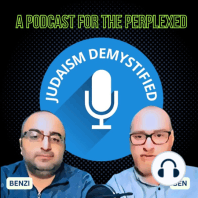1 min listen

Episode 31: Dr. Susan Weissman "Ghosts, Purgatory & the Undead"
FromJUDAISM DEMYSTIFIED | A Guide for Today's Perplexed: Confronting the Challenges of This Generation
Episode 31: Dr. Susan Weissman "Ghosts, Purgatory & the Undead"
FromJUDAISM DEMYSTIFIED | A Guide for Today's Perplexed: Confronting the Challenges of This Generation
ratings:
Length:
99 minutes
Released:
Nov 21, 2022
Format:
Podcast episode
Description
Dr. Susan Weissman delivers a thorough examination of particular areas of Sefer Hasidim by Rabbi Yehuda HaHasid. In her book titled 'Final Judgment and the Dead in Medieval Jewish Thought', she presents how influential this book was on Jewish culture, who was Rabbi Yehuda HaHasid, how accepted his book was at that time, and how it impacts Ashkenazi Jewry today. In her book, she compares and contrasts the Talmudic treatment of the dead and afterlife to its treatment in Sefer Hasidim, as well as the Christian influence on it. Chazal were no strangers to using the dead in their didactic tales and anecdotes, most famously with Eliyahu HaNavi appearing to numerous Sages. However, in Sefer Hasidim this phenomenon takes on a whole new meaning and dimension. What are the differences between the Talmud and Sefer Hasidim in their portrayal of the dead appearing to the living, and what are the reasons for these differences? We explore this in depth. Also, the idea that the "sinful dead" come back to earth as punishment for their sins is completely absent in Talmudic literature, yet in Sefer Hasidim this phenomenon is introduced to us in numerous passages which details their returning in earthly form and even posing a danger to the living. This phenomenon is completely absent in earlier Talmudic literature. Additionally, the Talmudic Sages viewed the cemetery as a place devoid of sanctity, and the living were forbidden from observing the commandments in the presence of the dead buried there. Sefer Hasidim, on the other hand, portrays Jewish burial sites in a way that reflects the notion of a cemetery as a holy space. Lastly, in regard to sin, penance and purgation, a very unique picture emerges in Sefer Hasidim. More than any other area in the book, it is in these matters in where it veered away from, if not contradicted Chazal in such a blatant fashion. What was the Rabbinical attitude towards sin and penance in contrast to Sefer Hasidim? And to go even more in depth, it seems that the cultural influence in these matters were highly specific. Dr. Weissman explains that it's not popular Christianity which fueled Rabbi Yehuda HaHassid’s ideas in these matters, but rather it was a very localized and specific influence of an early medieval pre-purgatorial penitent tradition that still persisted in Germano-Christian society of his day. If you thought vampires, werewolves, and zombies play no part in Judaism, think again. The relevance of this episode is that it alerts us that foreign, harmful ideas do in fact creep into our tradition (even from well-meaning people) and therefore we must be diligent in our studies and committed to returning to fundamentals.
Released:
Nov 21, 2022
Format:
Podcast episode
Titles in the series (93)
JUDAISM DEMYSTIFIED : A Guide for Today's Perplexed | Jewish Philosophy | Torah | Rational Bible (Trailer) by JUDAISM DEMYSTIFIED | A Guide for Today's Perplexed: Confronting the Challenges of This Generation